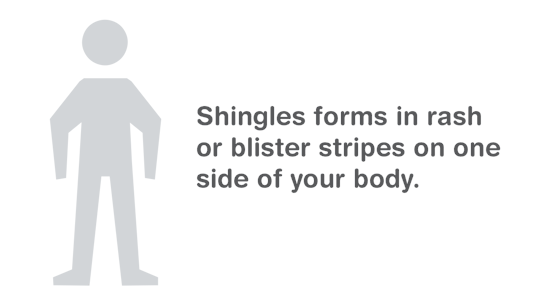
Do you remember getting chicken pox? Nearly 95% of Americans have had the virus by the time they reach adulthood.

The bad news is if you had chicken pox the virus may return in the form of shingles, also known as herpes zoster. The good news? Shingles is easily preventable.
1. Shingles is common
- One in three Americans will develop the shingles.
- There are an estimated 1 million cases each year in the U.S.
- The risk of shingles increases with age. At age 85, your risk of getting shingles is 50-50.
- When the virus reactivates, the symptoms are similar to the flu: headaches, chills, upset stomach, diarrhea and tender lymph nodes are common.
2. Shingles can be painful
- Shingles usually includes a painful rash that lasts 2‑4 weeks with blisters and can occur anywhere on your body. Before the rash appears, you might feel tingling, itching or even numbness.
- The pain from shingles can disrupt your sleep and affect your mood..
- Sometimes, shingles can attack your face and eyes. If not treated promptly, you may risk losing your vision.
- Treatment options are limited. Treatment is generally most effective when shingles is recognized and treated within 24 hours of the appearance of the rash.
- About one in five people with shingles will suffer long-term nerve pain or post-herpetic neuralgia (PHN).

3. Shingles is preventable – get vaccinated!
- The best way to prevent shingles and its complications is to get vaccinated.
- The shingles vaccine (zoster vaccine) is recommended for all adults age 60 and older and may be indicated for younger people with certain conditions.
- Most health insurance covers the shingles vaccine if you are over age 60 or have certain diseases, but contact your individual insurance company to be sure.
- Only one vaccine is needed in your lifetime. In rare cases, if you get the shot and still get infected, the effects of the virus won’t be as severe.
To learn more about shingles and the vaccine, talk to your local Walgreens pharmacist.
By Karen Babos, D.O., M.B.A.
Karen Babos is a primary contributor to the Stay Well blog and the Vice President of Clinical Programs and Quality for Walgreens. She is triple-board certified in internal medicine, geriatric medicine and hospice and palliative care


